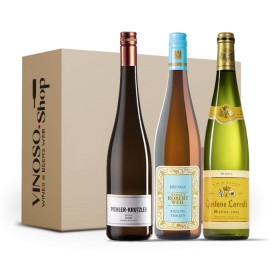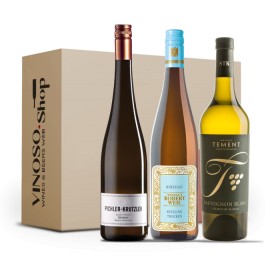- Mondo Vino
- 3585 views

The Rheingau is located in the heart of Germany and is a microarea that has become famous for Riesling and the Eiswein,whose rolling hills are dotted with monasteries, castles and vineyards, where the Rhine creates ideal conditions for vine growth. The largest Rieslings in the world are born along the banks of this river. Often the result of late harvests and where the ripening of the grapes goes until December. They are white, fragrant and elegant and age for years in the historic cellars of castles and medieval palaces. The most cultivated grapes in the Rheingau are Riesling and Spätburgunder (Pinot Noir). To give life to the ancient wine tradition of the region were the monasteries of the Rheingau, which soon began to cultivate the vines. The reputation of producers of wines of the highest quality has opened the doors of all the most important noble houses to them. In the Rheingau the oused areas cover 3,000 hectares. This is a classic Riesling territory (78.5% of vineyards), although the Spätburgunder (Pinot Noir) is becoming increasingly important (12.5%). Müller-Thurgau, Ehrenfelser, Weiß- and Grauburgunder (Pinot bianco e grigio), Dornfelder, Portugieser and Frühburgunder (Early Pinot Noir) are also cultivated. Productions of international varieties such as Chardonnay, Sauvignon Blanc, Cabernet Sauvignon and Merlot are also increasing. Rheingau soils are composed of clay shale, quartzite, phylloite, tertiary sediments and loess - ice age dust. Since it is the soil that strongly determines the character of the wine, the great variety of soils causes there to be a great complexity of aromas in the glass: mineral wines with gray clay shale (Lorch), the famous reds of Assmannshausen with red clay shale, robust wines from quartzite (from Rüdesheim to Martinsthal), full-bodied wines from the clayey tonmergel (e.g. Erbacher Marcobrunn or Domdechaney and Hölle to Hochheim). Loess is found everywhere and produces delicate and fruity Rieslings. The Rheingau is characterized by its mild, almost Mediterranean climate. The composition of companies in the Rheingau is quite fragmented. More than half of the cultivated area is cultivated by 63 holdings, each of which has more than 10 hectares. 283 farms between 1 and 10 hectares cultivate about 1,300 hectares and about 100 hectares are in the hands of small farms. Weingut Robert Weil is a historic wine estate in the Rheingau(Germany), founded in 1875 by Robert Weil, and now led by Wilhelm Weil, its direct fourth-generation descendant. Robert Weil bought his first vineyards in the Kiedricher Berg area in 1867, when he was still professor of German at the Sorbonne in Paris. With the advent of the Franco-Prussian War of 1870-71, he was forced to leave France and moved to Wiesbaden, where he began working as a journalist, while dedicating himself to the acquisition of new vineyards in the most suitable areas of kiedricher berg. Today Weingut Robert Weil has a total of 90 hectares of property, all cultivated in Riesling. This absolute dedication to a single variety, from 1875 to the present, has made Robert Weil become in the eyes of numerous observers and international experts the quintessential symbol of German Riesling.


